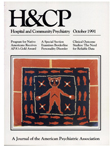Biological and Pharmacological Aspects of Borderline Personality Disorder
Abstract
Biological and psychopharmacological research focusing on patients with a DSM-III-R diagnosis of borderline personality disorder suggests that the disorder may encompass three clusters of symptoms—affective instability, transient psychotic phenomena, and impulsive aggressive behavior—that have different underlying biological substrates that respond to different classes of pharmacological agents. Affective instability, which may be related to abnormalities in the brain's adrenergic and cholinergic systems, appears to respond to agents such as lithium and carbamazepine that are effective in treating major affective disorders. Abnormalities in central dopaminergic systems may underlie transient psychotic symptoms. This relationship is consistent with reports of beneficial effects of low-dose neuroleptics in treating some borderline patients. Abnormalities in central nervous system serotonergic functioning appear to underlie impuhive aggressive behaviors. These behaviors may respond to serotonergic agents such as fluoxetine.
Access content
To read the fulltext, please use one of the options below to sign in or purchase access.- Personal login
- Institutional Login
- Sign in via OpenAthens
- Register for access
-
Please login/register if you wish to pair your device and check access availability.
Not a subscriber?
PsychiatryOnline subscription options offer access to the DSM-5 library, books, journals, CME, and patient resources. This all-in-one virtual library provides psychiatrists and mental health professionals with key resources for diagnosis, treatment, research, and professional development.
Need more help? PsychiatryOnline Customer Service may be reached by emailing [email protected] or by calling 800-368-5777 (in the U.S.) or 703-907-7322 (outside the U.S.).



